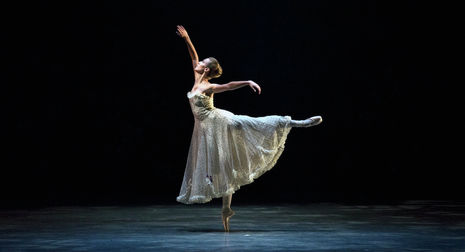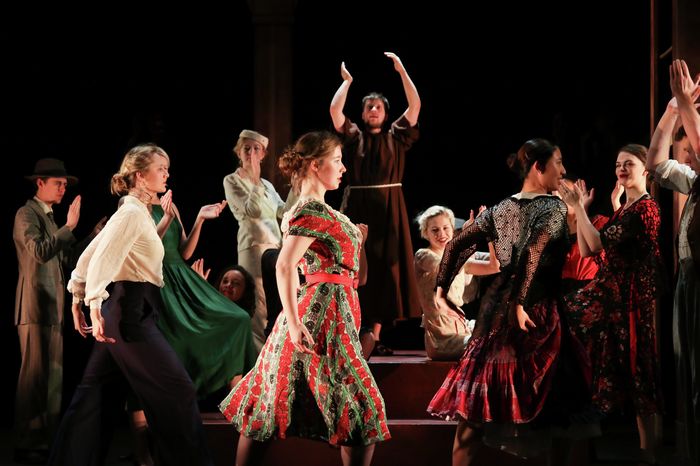The faux outrage over Fatima the Ballerina
With the theatre world facing unprecedented challenges, support for the industry is needed, but those in the arts should keep an open mind when looking for work, says Anna Trowby.

It is no secret that the series of local and national lockdowns in this country has decimated the film and theatre industry. An already insecure environment, where over 90% of actors are out of work at any one time, has become further destabilised by a second national lockdown mandating that people stay at home to stem the spread of COVID-19. Just as theatres and cinemas were beginning to open with new productions, they’ve been forced to shut down without warning. It’s easy to see why theatre professionals are frustrated at the lack of consideration afforded to their industry. Their main places of work have been boarded up and closed – perhaps for good – and they have lost their main sources of income.
We saw an intense expression of this grievance in their reaction to a particular ad. We all know the one. We can probably quote it by heart from now – ‘Fatima’s next job could be in cyber (she just doesn’t know it yet.)’ The advert, representing a ballerina, took a condescending tone towards the arts to which many in the industry reacted strongly. Upon seeing the advert, I was also astounded that a government with no knowledge or experience of the arts was lecturing theatre workers on what to do with their careers. However, upon careful reflection and further research, I concluded that this outrage was misplaced.
“I was also astounded that a government with no knowledge or experience of the arts was lecturing theatre workers on what to do with their careers.”
When the advert originally courted controversy online, many critics assumed that it was created during lockdown to encourage theatre workers to enter more ‘viable’ industries. However, the advert was created in 2017 as part of a recruitment drive targeting different workers to retrain in cyber-security. Other jobs targeted included bakers and grocers. The controversy intensified when it was falsely reported by ITV News that Rishi Sunak, our current Chancellor, said that theatre performers should ‘retrain and find other jobs’. ITV retracted and corrected their original statement, framing Sunak’s comments as part of a general drive to retrain workers from all types of jobs. Knowing this, the outrage over the ad seems largely manufactured.
I understand people’s frustrations, but I struggle to see how getting upset over an advert made three years ago before the current pandemic will do anything to save the arts. I have seen some people on Facebook argue that this ad, regardless of its background, reflects a wider culture that devalues the arts and makes it difficult to pursue careers in the creative industries. However, I find this sentiment vain when expressed in response to this advert. Many people across various industries have unfortunately been made redundant as a result of Covid-19 – over 200,000 job losses have been announced across the hospitality, bank, retail and travel sectors since March, yet we don’t see these workers feigning outrage over an ad created three years ago. These industries have been massively disregarded during the pandemic, but I haven’t seen a single pilot or baker express fury over the government ads in the way that theatre professionals have. Vanity masquerading as righteousness makes creatives seem more out of touch with the working world than we are, and it speaks to a sense of entitlement that our jobs are worth more protecting from the realities of a changing economy more than others those in other industries.
“Vanity masquerading as righteousness makes creatives seem more out of touch with the working world than we are.”
A lot of the same people expressing outrage also contributed to the loss of theatre by clamouring for a lockdown that would inevitably make many creatives redundant for months to come. Instead of having a productive discussion with the government and other professionals in their industry about how best to open theatres again, we’ve wasted our time getting angry at an advert and achieving nothing substantial. It’s also incredibly disingenuous to advocate for something that would clearly go badly for the arts, which thrives on live performance and audience interaction, and then blame others for not appreciating their industry enough. We cannot expect others to respect our industry if we do little to protect it during times of crises. The theatre world is suffering – historic playhouses like the Globe and the Old Vic are at risk of permanent closure and the West End is predicted to lose 97% of its original value by 2024, projecting a fall to £100 million from £4.9 billion in 2019. Arguing over an ad will not improve these dire figures.
The outrage also reeked of classism. The uncomfortable truth of theatre – as well as many other industries – is that people change jobs. My grandad worked as a taxi driver, lorry driver and builder, while my dad worked as a factory worker, a fruit picker, and a bookstore assistant before becoming an academic. I anticipate that I’ll have to work multiple jobs and retrain if my original plans fall apart, and I have come to terms with that reality while preparing to enter the theatre industry.
However, on my Facebook feed I saw many problematic posts by my fellow performers acting as if they were above changing jobs and the demands of a normal working life. One man called acting a ‘calling’, but I wonder if he realises that this calling also flourishes on a stable income and basic needs being met. A lot of people responded to this advert as if they were above changing jobs – as if their livelihoods were just too important to face the reality of people who change careers. While I appreciate that many people were frustrated about perhaps being told to adopt a new career path during a pandemic, I also feel that a lot of the outrage was not necessarily aimed at the pandemic itself but rather a contempt at the idea of even having to switch careers. Regardless of the pandemic, theatre work is seen as a sanctified profession, an artistic endeavour. This damaging myth obscures the fact that acting is a job like any other. Because of this, theatre work is unfortunately subject to the same fluctuating economy and career trends as any other profession, and we have to be honest about this reality instead of acting as if we’re better than ordinary people and cannot change jobs for anything. Theatre professionals do change careers and do have to make tough decisions about their career prospects, and being snobbish towards these individuals is incredibly patronising and shows a distaste for working people.
“Regardless of the pandemic, theatre work is seen as a sanctified profession, an artistic endeavour.”
It is normal, even within the theatre industry, to retrain, and to sneer at this is unhelpful. For people to say that their ambitions are too special to change careers for speaks not only to an unrealistic self-belief in an already insecure industry, but also to a middle-class conceit that somehow sets them apart from other working-class people. This response smacks of entitlement and does nothing to negate the reputations of theatre professionals as out-of-touch narcissists. Given that theatre has long had a reputation as a middle-class pursuit, this response merely amplified assumptions about the theatre industry, while reflecting poorly on theatre workers.
If these posts were merely made to defend the arts industry, I would express solidarity with them, but several took this sentiment too far. I saw posts glamorizing poverty – the typical expression of ‘I would rather be poor and live for my dream’ – which was tasteless given how masses of people in this country have been plunged into financial insecurity as a result of the lockdown (The Institute for Fiscal Studies recently revealed that the poorest fifth of society saw their savings reduced by £170 a month). The only people rejoicing in poverty were the ones who had never lived through substantial poverty at all.
“I will not be outraged for the sake of it. If you are angry about the state of the arts, I encourage you to use your frustration in a more productive way.”
I stand by the importance of the arts industry, which many people make huge sacrifices to work in and which contributes to the cultural and financial lifeblood of our society. The theatre industry contributes £11 billion a year to the UK economy, and it provides entertainment for huge swathes of the population. Having said that, I will not be outraged for the sake of it. If you are angry about the state of the arts, I encourage you to use your frustration in a more productive way. Instead of virtue signalling over the faux plight of Fatima the Ballerina, artists and theatre professionals should instead set out practical ways for our industry to reopen. We should be firm in expressing to the government why our industry is so vital and why we need to reopen theatres if the arts are going to survive. We should negotiate with them in forming plans on how to reopen these avenues so that theatre professionals should get to work. We should also come together to discuss how to fairly spend the £1.57 billion grant that our government has given us – a bonus that was much bigger compared to the funding ejected into essential workers’ salaries.
 News / Eight Cambridge researchers awarded €17m in ERC research grants27 December 2025
News / Eight Cambridge researchers awarded €17m in ERC research grants27 December 2025 News / Downing investigates ‘mysterious’ underground burial vault 29 December 2025
News / Downing investigates ‘mysterious’ underground burial vault 29 December 2025 Lifestyle / Ask Auntie Alice29 December 2025
Lifestyle / Ask Auntie Alice29 December 2025 Sport / Hard work, heartbreak and hope: international gymnast Maddie Marshall’s journey 29 December 2025
Sport / Hard work, heartbreak and hope: international gymnast Maddie Marshall’s journey 29 December 2025 Interviews / Meet Juan Michel, Cambridge’s multilingual musician29 December 2025
Interviews / Meet Juan Michel, Cambridge’s multilingual musician29 December 2025









